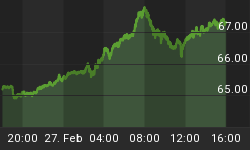Beating up on the Fed used to make you an oddball. Does it still? That is the question Slate asks in Fed-Bashing Three Ways.
According to a pre-election Bloomberg poll, 60 percent of likely voters who self-identified as Tea Party members said they want to see the Federal Reserve either reined in or abolished. Rand Paul, the Republican senator-elect from Kentucky, campaigned in part on an anti-Fed platform. Fed-bashing is often shrugged off as something that oddballs do whenever the country hits hard economic times. But if that's the case, then why is Jeremy Grantham railing against the Fed too?
Grantham, the chief investment officer of the big Boston money management firm GMO, is nobody's idea of an oddball; he is a well-respected longtime professional. Yet he just wrote a report titled "Night of the Living Fed." The cover page resembles a poster for a horror flick, complete with a subhead -- "Something Unbelievably Terrifying!" -- and scary captions: "Homes Destroyed! Runaway Commodities! Currency Wars!"
The thought process behind the anger at the Fed isn't uniform. If Dante had nine circles of hell, then the Fed has three circles of doubters. The first circle is critical of the Fed's current policies. The second circle thinks that the Fed has been a menace for a long time. The third circle wants to seriously curtail or even get rid of the Fed.
Grantham occupies the second circle. He sees the repeat of a familiar pattern in which the Fed's low-interest-rate policies create bubbles. In the 1990s, the bubble was in tech stocks. In the aughts, the bubble was in housing. Now the bubble might be in junk bonds and commodities. What typically happens, Grantham argues, is that the Fed disavows any responsibility for spotting or stopping the bubbles before they wreak havoc. (Remember both Greenspan's and Bernanke's insistence that there was no nationwide housing bubble? Greenspan called it "froth.") The madness in housing, Grantham writes, "was a direct outcome of a policy that is clearly still in place." The Fed's "complete refusal to learn from experience" makes it harder to create "a healthy, stable economy with strong [i.e., low] unemployment," Grantham concludes.
Night of the Living Fed (A 2008 Claim)
I have been talking about these ideas for years, also in length. Indeed, I can even stake claim to the exact title Night of the Living Fed as of Tuesday, March 11, 2008.
What I said then, still holds true today. Please check it out.
Moreover, Grantham's statement regarding the Fed's "complete refusal to learn from experience", is rather generic but that just happens to be Fed Uncertainty Principle (April 3, 2008), Corollary Number Three.
Uncertainty Principle Corollary Number Three: Don't expect the Fed to learn from past mistakes. Instead, expect the Fed to repeat them with bigger and bigger doses of exactly what created the initial problem.
That aside, I certainly do not mind the company of Grantham at all. In fact I am quite pleased we are on the same page.















